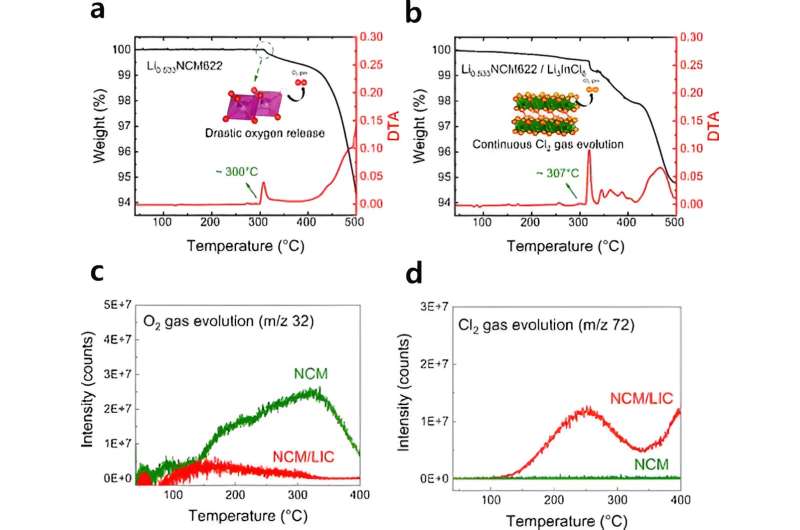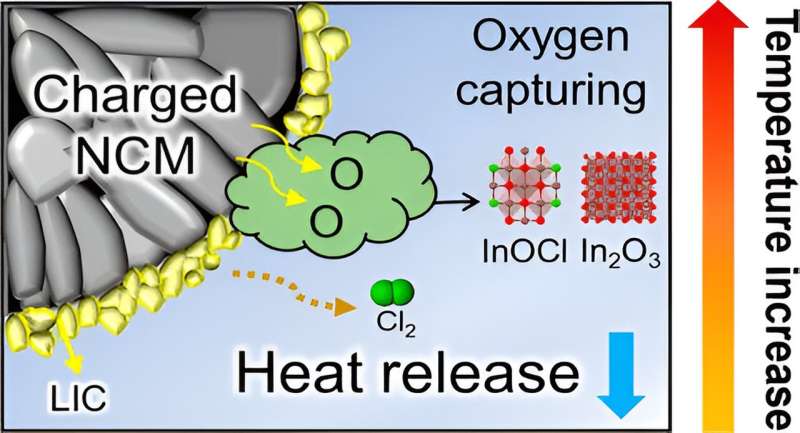New study reveals enhanced thermal stability in all-solid-state batteries
A study led by Professor Sung-Kyun Jung and his research team in the School of Energy and Chemical Engineering at UNIST has unveiled a more stable approach to utilizing all-solid-state batteries (ASSBs), setting a new standard for the development of safe battery systems.
Conventional lithium-ion batteries, powered by organic liquid electrolytes, have long been associated with a high risk of fire and explosion. To mitigate these dangers, the research community has turned its attention to ASSBs that leverage non-flammable inorganic solid electrolytes.
In the pursuit of next-generation solid-state batteries, sulfide solid electrolytes have emerged as promising materials. However, challenges related to thermal instability, stemming from exothermic reactions and explosive decomposition products at the interface between sulfide solid electrolytes and electrode materials, have persisted.
In a significant breakthrough, the research team explored the use of halide-based solid electrolytes to enhance thermal stability. By replacing sulfide solid electrolytes with halide counterparts, such as Li3InCl6, the team observed improved oxidation stability and reduced oxygen evolution from the cathode.
The study involved the creation of a composite material combining Li3YCl6 (LIC) with a charged cathode material (Li1-xNi0.6Co0.2Mn0.2O2), known as NCM622. The results demonstrated that the halide-based solid electrolyte contributed to delaying the decomposition of NCM622 and suppressing combustible oxygen-gas evolution through an endothermic phase transition process.

Notably, the research team observed similar positive outcomes with other halide solid electrolytes, including Li3YCl6 and Li2ZrCl6, across various cathode materials such as LCO. Lead author Sangpyo Lee highlighted the significance of these findings, stating that they offer a novel approach to enhancing the thermal stability of solid-state batteries and provide essential design criteria for safe battery systems in the future.
Professor Jung underscored the pivotal role of the interplay between the cathode and solid electrolyte in governing the thermal stability of ASSBs, emphasizing the potential impact on the design and development of solid electrolytes for secure battery systems.
More information:
Sangpyo Lee et al, Interplay of Cathode–Halide Solid Electrolyte in Enhancing Thermal Stability of Charged Cathode Material in All-Solid-State Batteries, ACS Energy Letters (2024). DOI: 10.1021/acsenergylett.4c00033
Ulsan National Institute of Science and Technology
Citation:
New study reveals enhanced thermal stability in all-solid-state batteries (2024, April 9)
retrieved 9 April 2024
from https://techxplore.com/news/2024-04-reveals-thermal-stability-solid-state.html
This document is subject to copyright. Apart from any fair dealing for the purpose of private study or research, no
part may be reproduced without the written permission. The content is provided for information purposes only.

Comments are closed